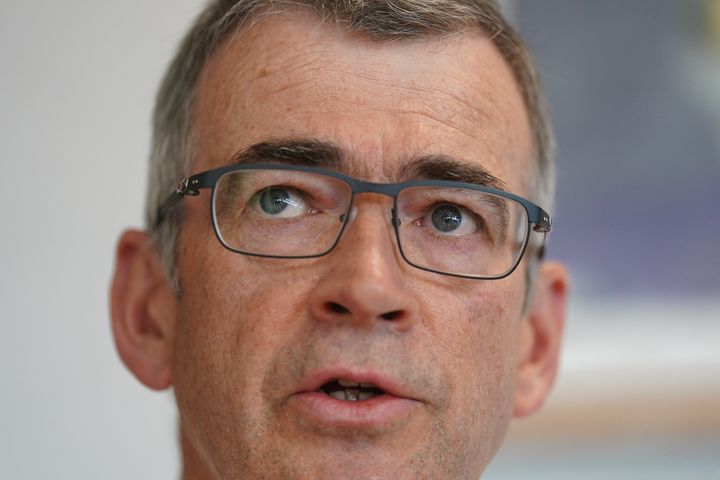Gardaí weren’t notified of plan to house asylum seekers at Galway hotel set on fire – Drew Harris

[ad_1]

Drew Harris has told the Policing Authority there is no correlation between increased crime rates and international protection centres
The disused Ross Lake House Hotel in Rosscahill was severely damaged in the blaze at the weekend, prompting a political reaction.
The Policing Authority this afternoon was told how gardaí were only told informally of the plan over the weekend and weren’t notified through official channels.
Garda Commissioner Drew Harris told the policing watchdog it is critical for them to be in the loop to put a policing response in place, including potential security arrangements and crime prevention advice for the occupants and property owner.
The chair of the Policing Authority, Bob Collins, said it is unsatisfactory and that they find this difficult to understand why gardaí weren’t notified.
It came as Garda Commissioner Drew Harris told the watchdog that there is no evidence to suggest an “invisible or guiding hand” was behind the recent targeting of asylum centres.
He also said that there is no correlation between crime and asylum centres, describing any such claim as “deceitful lies based on falsehoods”
Several attacks have been carried out so far this year on properties earmarked for housing asylum seekers, with the latest such incident occurring on Saturday night.
Protests had taken place at the The Ross Lake House Hotel in the hours before the suspected arson attack.
Speaking this afternoon, the Commissioner said that all of the incidents are being investigated and added that there is “no evidence to suggest there is a coordinated effort that there’s some in effect invisible hand or guiding hand in these attacks”.
He said the premises which was gutted in Galway on Saturday night is “very remote, very difficult to find”, indicating that the suspect or suspects are “living quite close in that area” and efforts are underway to identify those involved.
The garda chief said it is “easy to blame some nebulous ill-defined group” as planning these incidents but that it is based on prejudice and driven at a local level.
He added that there is no correlation between increased crime rates and international protection centres, and that these centres give them “very little policing issues”.
The Commissioner added that any such claims being spread are “deceitful lies based on falsehoods”.
At a meeting of the Policing Authority in Dublin he also said that a number of suspects have been charged in relation to other incidents.
This year there have been 585 protests in Dublin, 227 of which are categorised as anti-immigration, housing and anti-refugee, saying policing these events is a growing facet of their work.
The garda chief said that 52 people have been arrested during the policing of these events with further follow-up arrests and files being sent to the Director of Public Prosecutions.
“There is a perhaps growing concern, and this is a concern seen across Europe, about the rise of political extremism and protest and violence that follow,” he said, adding that “obviously the far-right are an element of that”.
The authority has also been discussing the Dublin riots which broke out after three children and their teacher were stabbed on Parnell Square on November 23.
The Commissioner said that investigations are ongoing into those suspected of planning and instigating the riots.
Some of these, he said, were easily identifiable while others used concealments to hide their identities with gardaí liaising with the DPP.
A review of the policing response has been carried out by Assistant Garda Commissioner, Paul Cleary, who said it is apparent that the organisation has a number of policies around equipment and training that need to be addressed.
He said 464 members were engaged in some way in policing events that day, and that 13 were injured including one hospitalised with a severed toe.
Mr Cleary said 286 members were asked to give feedback of the event with over 60pc responding on issues around communication, coordination and planning, and training and tactics.
The meeting heard that only nine members of the 186 who responded, or 5pc, referenced a lack of confidence in the use of force.
He commended the dedication, bravery and professionalism of gardaí who put themselves in harms way to keep people safe during a serious public disorder event which he said was challenging given the spontaneous and volatile nature of it.
The Commissioner said the biggest area of feedback was around communication, and has recommended that the public order unit members have their helmets adapted to fit earpieces, and the utilisation of loudhailers.
[ad_2]